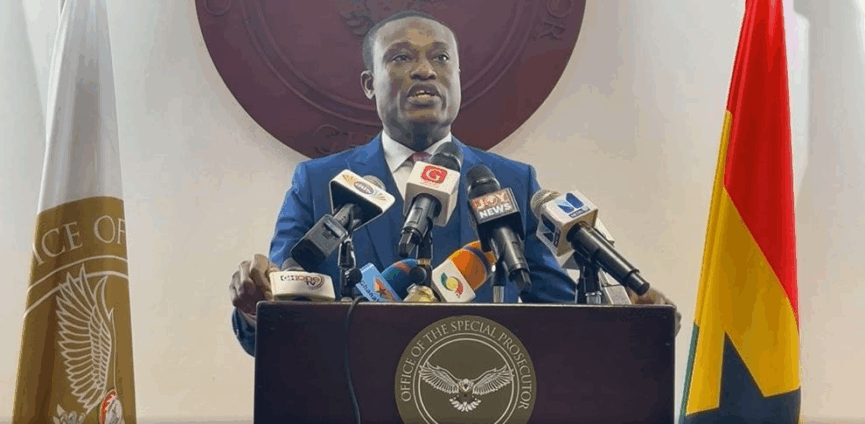
Audio By Carbonatix
Special Prosecutor, Kissi Agyebeng, has called for a mechanism to verify and trace assets declared by public officials, but opposed making such documents publicly accessible.
He made the call at the African Union Advisory Board Against Corruption (AUABC) conference in Accra.
The event, held over the weekend, was on the theme “Revitalising the Anti-Corruption Architecture in Africa: Ghana’s Accountability Journey.”
Last month, President John Dramani Mahama ordered the forfeiture of three months’ salary of some public officials, donating the funds to the Ghana Medical Trust Fund.
The President also warned appointees to declare their assets by May 6, 2025, after 55 officials and staffers failed to comply, as reported by the media.
This reignited calls—especially from Civil Society Organisations (CSOs)—for the government to take punitive action against defaulters, citing weak transparency and accountability measures.
“We should move beyond mere repositories to a system of verifying and tracing undeclared assets,” Mr. Agyebeng stated.
However, he opposed the public disclosure of asset declarations, arguing that it would expose officials to undue scrutiny and potential reprisals.
“In my estimation, a publication of who has declared or has not declared his assets, in the context of a workable asset verification and tracing model, would be sufficient to assure the integrity of the asset declaration system,” he noted.
The Special Prosecutor urged incorporating integrity into the educational system, from basic to tertiary level, as a key strategy to curb corruption.
“A student who regards a corrupt businessman as his or her role model would invariably emulate him without remorse. A society in which the youth adore and celebrate ill wealth would only reap get-rich-quick corrupt and fraudulent practices,” he said.
Mr. Agyebeng recommended that unexplained wealth exceeding legitimate income should be subject to confiscation, proposing that lifestyle audits be enshrined in the Constitution.
He also suggested that sanctions be prescribed beyond asset declarations to ensure that properties acquired after initial declarations—without reasonable sources—fall under constitutional provisions.
“We must strive to change the narrative and fashion our own cause and course by keeping the glimmer on the horizon glowing until the light beckons closer and shines overhead in a just and prosperous trajectory,” he said.
Latest Stories
-
Africa’s top editors converge in Nairobi to tackle media’s toughest challenges
47 minutes -
Specialised courts, afternoon sittings to tackle case delays- Judicial Secretary
50 minutes -
Specialised high court division to be staffed with trained Judges from court of appeal — Judicial Secretary
1 hour -
Special courts will deliver faster, fairer justice — Judicial Secretary
2 hours -
A decade of dance and a bold 10K dream as Vivies Academy marks 10 years
2 hours -
GCB’s Linus Kumi: Partnership with Ghana Sports Fund focused on building enduring systems
3 hours -
Sports is preventive healthcare and a wealth engine for Ghana – Dr David Kofi Wuaku
3 hours -
Ghana Sports Fund Deputy Administrator applauds GCB’s practical training for staff
3 hours -
Ghana Sports Fund strengthens institutional framework with GCB Bank strategic partnership
3 hours -
UBIDS to Complete Abandoned Projects Following GETFund Financial Clearance – Vice Chancellor
3 hours -
Nii Moi Thompson questions Anokye Frimpong’s ‘distorted history’ narratives
4 hours -
Anthony O’Neal set to receive Ghanaian citizenship, prepares to launch ‘Class on the Bus’ Initiative
4 hours -
South Tongu MP inspects GH₵500,000 surgical equipment, supports District Court with logistics
5 hours -
Kpasec 2003 Year Group hosts garden party to rekindle bonds and inspire legacy giving
7 hours -
Financing barriers slowing microgrid expansion in Ghana -Energy Minister
7 hours

